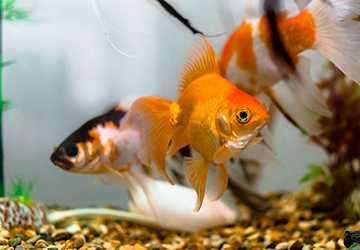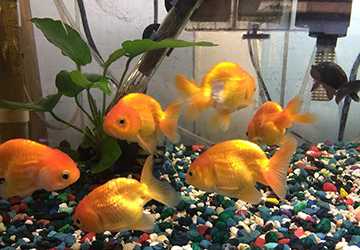Goldfish are one of the most popular and well-known aquatic pets for their bright colors and graceful movements. These adorable creatures can add beauty to your home if you give them the care they need.
To ensure your goldfish lives a long and healthy, it's essential to understand its specific needs and provide proper care. In this article, we'll cover critical care tips to help you keep your goldfish healthy and allow them to thrive in your aquarium.
The best ways to keep your goldfish healthy and happy:
There are many ways to keep your goldfish happy and healthy, but we've chosen the best and easiest one.

Choose the right aquarium.
Choosing the right aquarium is the first step to ensuring your goldfish is happy and healthy. Goldfish require a spacious tank due to their active nature and rapid growth. Please provide at least 20 gallons of water per goldfish to give them enough room to swim and grow. Larger tanks help maintain water quality and reduce the risk of stress and illness caused by overcrowding.
Water quality is essential.
Maintaining good water quality is vital to the health of your goldfish. Regularly check the ammonia nitrogen, nitrite, nitrate, pH value, and water body temperature. Ammonia and nitrite levels should be constant at zero, while nitrate (N) levels should be below 40 ppm. Goldfish thrive in water with a pH between 7.2 and 7.6.
Consider investing in a high-quality filter to remove waste and contaminants from your water for optimal water quality. Regular water changes (approximately 10-20% of the tank volume every 1-2 weeks) are essential to remove accumulated toxins and replenish important minerals.
Choose the suitable substrate.
Goldfish are notorious for digging and sifting through the substrate, which can lead to ingestion of gravel or sand and health problems. To prevent this, choose gravel that is large, smooth, and rounded, or choose a substrate that is not easily swallowed, such as sand. Ensure easy cleaning to maintain good water quality.
Ensure adequate filtration
Goldfish are known for their messy eating habits, which can lead to excessive waste in the aquarium. To combat this problem, invest in a powerful filtration system appropriate for the size of your aquarium. A good filter helps remove dirt and toxins and ensures the water remains clean and clear.
Feed correctly
Providing your goldfish with the proper diet is vital to its health and happiness. Goldfish are omnivores and require a balanced diet, including high-quality pellets or flakes explicitly designed for goldfish.
Additionally, you can supplement with fresh or blanched vegetables such as peas, spinach, and zucchini. Avoid overfeeding, as excess food can lead to obesity and water quality problems. Feed your goldfish small amounts two to three times a day as long as it eats it within a few minutes.
Keep water temperature constant.
Goldfish are cold-water fish and prefer a stable temperature range between 18°C and 24°C. To maintain this temperature, consider using a reliable aquarium heater or storing the aquarium in a location where it will not experience extreme temperature changes. Do not place the tank near a radiator, air conditioning vent, or direct sunlight.
Avoid overcrowding
Goldfish are social animals, but overcrowding can lead to stress, aggression, and disease. Follow the recommended number of gallons per fish rule and avoid keeping incompatible species together. Common goldfish like the Comet Goldfish and Shuwen Goldfish can grow quite large, so plan to size them accordingly.

Change water regularly
Regular water changes are essential for maintaining pristine water quality and keeping your goldfish healthy. As mentioned before, a 10-20% water change every 1-2 weeks is recommended. When doing these routine water changes, it's important to make sure you're using reliable tap water. Process dechlorinators effectively remove harmful chlorine and chloramines. This simple but essential step in your goldfish care routine will help protect their health and create a consistently supportive aquatic environment.
Watch for signs of illness.
Like all pets, goldfish can get sick. It is essential to monitor them for signs of illness or distress. The most common goldfish health problems include swim bladder problems, white spot disease, fin rot, and fungal infections. If you notice any unusual behavior, changes in appearance, or signs of stress, contact a veterinarian specializing in fish care.
Provide adequate lighting
Goldfish need a regular day and night cycle to thrive and maintain their natural rhythms. Providing them with appropriate lighting that mimics their natural surroundings is essential. However, be careful when exposing your aquarium to too much direct sunlight, which may lead to undesirable consequences such as algae growth—and temperature fluctuations.
To ensure your goldfish receives proper light, consider using a timer to adjust your lighting schedule continuously and provide 10-12 hours of lighting per day. This consistent lighting routine helps create a stable and comfortable environment for your goldfish, promoting overall health and happiness.
Stimulate your surroundings
Goldfish are very smart and like mental stimulation. Adding aquarium decorations and plants (natural or artificial) can provide them with places to hide and opportunities to explore their surroundings more engagingly.
It's important to remember that goldfish can eat live plants. So, when choosing plants for your aquarium, select hardy varieties that can withstand their prying eyes. This can improve your mental health and add beauty to your underwater world, creating a richer, more enjoyable experience for you and your aquatic companions.
Quarantine new arrivals
If you plan to add new fish to your aquarium, you should always quarantine them in a separate/different tank for a few weeks before adding them to the main aquarium. This vital practice serves a dual purpose: it helps prevent disease in the aquarium. This ensures the new fish is in optimal health before joining your existing goldfish community.
Diploma
Keeping your goldfish healthy and happy requires a combination of proper aquarium setup, water quality management, balanced nutrition, and attentive care. Following these essential care tips, you can create a thriving aquatic environment for your goldfish and enjoy its beauty and charm for many years. Remember, goldfish can live for decades if properly cared for. So, I'm glad you're committed to their well-being.
